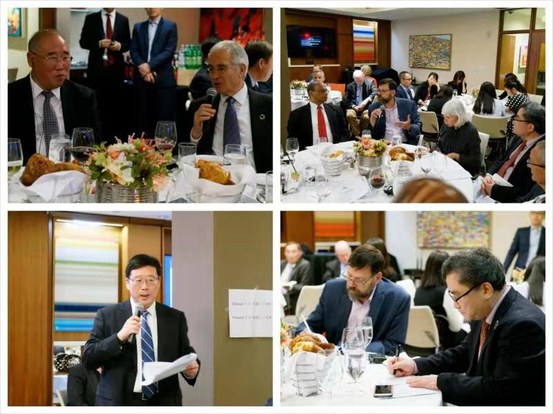Climate Champions Call for Accelerated Global Climate Action
On the eve of the United Nations Climate Summit in late September, Energy Foundation China, the Children’s Investment Fund Foundation, and the Institute of Science and Development of the Chinese Academy of Sciences organized a working dinner of Chinese and foreign experts on global climate governance and China’s role in New York City.

(Photo by Xin Jianan and Dong Yue)
More than 40 experts from China, the United States, the United Kingdom, Brazil, India, Mexico, France, and other countries and regions gathered for the dinner, which is chaired by Kate Hampton, CEO of the Children’s Investment Foundation.

(Photo by Xin Jianan and Dong Yue)
The 2019 United Nations Climate Action Summit launched the process leading to the enhancement of climate targets, which are expected to culminate in 2020 when all Parties to the Paris Agreement will update their nationally determined contribution (NDC) and submit their mid-century low greenhouse gas emission development strategies. China is also defining the targets of its 14th Five-Year Plan for 2021–2015 and will host the 15th Conference of the Parties to the Convention on Biological Diversity in 2020. The working dinner focused on three topics: enhancing China’s NDC, deploying clean power infrastructure in South and Southeast Asia, and promoting nature-based solutions and biodiversity protection. Experts agreed that the degradation of climate, ecosystems, and biodiversity has further intensified, uncertainty in the international climate governance has increased, and the challenges are often cross-cutting and overlapping with no silver bullets. Ambitious national action must be taken in line with the Paris Agreement, the sustainable development goals, the post-2020 Global Biodiversity Framework, and other multilateral commitments. Global climate governance should be improved through solid cooperative actions. Experts also underlined that China needs to commit to more ambitious climate targets, set binding carbon emission cap targets, and achieve emission peaking earlier to fulfill its commitments to the international community, improve global climate governance, and set a leading example worthy of a responsible country in the fight against climate change.

(Photo by Xin Jianan and Dong Yue)
Expert participants of the dinner include Xie Zhenhua, Vice-Chair of the China Council for International Cooperation on Environment and Development (CCICED) and Special Representative for Climate Change Affairs of China; Li Gao, Director-General of the Department of Climate Change of the Ministry of Ecology and Environment of China (MEE); Zhou Guomei, Secretary of the Leading Party Member's Group, Deputy Director-General of the Foreign Environmental Cooperation Center of the MEE and Deputy Secretary-General of the CCICED; John Podesta, former White House Chief of Staff; Mary Nichols, Chair of the Air Resources Board of California; Lord Nicholas Stern, Distinguished Professor of the London School of Economics and Political Science; Laurence Tubiana, CEO of the European Climate Foundation; Jonathan Pershing, Program Director of Environment for the William and Flora Hewlett Foundation and CCICED Special Advisor; Ajay Mathur, Chairman of the Energy and Resources Institute of India; Wang Yi, Member of Standing Committee of the 13th National People’s Congress of China and Vice President of the Institutes of Science and Development of the Chinese Academy of Sciences; and Zou Ji, CEO and President of Energy Foundation China.



